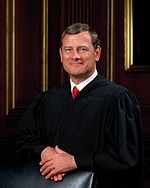John Roberts, Date of Birth, Place of Birth
TweetJohn Roberts
Chief Justice of the United States
 Date of Birth: 27-Jan-1955
Date of Birth: 27-Jan-1955
 Place of Birth: Buffalo, New York, United States
Place of Birth: Buffalo, New York, United States
Profession: judge, lawyer, politician, jurist
Nationality: United States
Zodiac Sign: Aquarius 
About John Roberts
- John Glover Roberts Jr.
- (born January 27, 1955) is an American lawyer and jurist who serves as Chief Justice of the United States.
- Roberts has authored the majority opinion in several landmark cases, including Shelby County v.
- Holder, National Federation of Independent Business v.
- Sebelius, King v.
- Burwell, and Department of Commerce v.
- New York.
- He has been described as having a conservative judicial philosophy in his jurisprudence, but has shown a willingness to work with the Supreme Court's liberal bloc, and since the retirement of Anthony Kennedy in 2018 has come to be regarded as a key swing vote on the Court.Roberts was born in Buffalo, New York, but grew up in northwestern Indiana and was educated in Catholic schools.
- He studied history at Harvard University, then attended the Harvard Law School, where he became the managing editor of the Harvard Law Review.
- He served as a law clerk for Circuit Judge Henry Friendly and then-associate justice William Rehnquist before taking a position in the Attorney General's office during the Reagan Administration.
- He went on to serve the Reagan administration and the George H.
- W.
- Bush administration in the Department of Justice and the Office of the White House Counsel, before spending 14 years in private law practice.
- During this time, he argued 39 cases before the Supreme Court.
- Notably, he represented 19 states in United States v.
- Microsoft Corp.In 2003, Roberts was appointed as a judge of the U.S.
- Court of Appeals for the D.C.
- Circuit by George W.
- Bush.
- During his two-year tenure on the D.C.
- Circuit, Roberts authored 49 opinions, eliciting two dissents from other judges, and authoring three dissents of his own.
- In 2005, Roberts was nominated to be an associate justice of the Supreme Court, initially to succeed the retiring Sandra Day O'Connor.
- When Rehnquist died before Roberts's confirmation hearings began, Bush instead nominated Roberts to fill the chief justice position.
Read more at Wikipedia
See Also
- Famous People's Birthdays on 27 January, United States
- Famous People's Birthdays in January, United States
- Famous judge's Birthdays on 27 January, United States
- Famous judge's Birthdays in January, United States
- Famous lawyer's Birthdays on 27 January, United States
- Famous lawyer's Birthdays in January, United States
- Famous politician's Birthdays on 27 January, United States
- Famous politician's Birthdays in January, United States
- Famous jurist's Birthdays on 27 January, United States
- Famous jurist's Birthdays in January, United States

